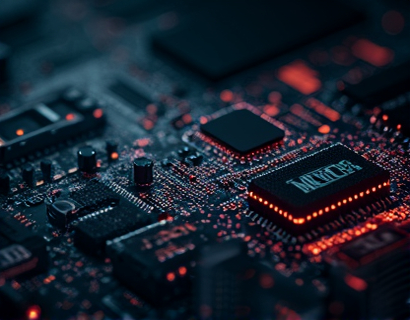Smart Contract Automation: Revolutionizing Business Payment Management
In the rapidly evolving landscape of financial technology, smart contract automation stands out as a transformative force, particularly in the realm of business payment management. This innovative approach leverages the inherent benefits of blockchain technology to automate, secure, and streamline financial transactions. By integrating smart contracts into payment processes, businesses can experience a significant enhancement in operational efficiency, transparency, and security. This article delves into the intricacies of smart contract automation, exploring how it can revolutionize the way companies manage dividends, earnings, and scheduled payments.
Understanding Smart Contracts
Before diving into the specifics of how smart contracts can transform business payment management, it's essential to understand what smart contracts are. A smart contract is a self-executing contract with the terms of the agreement directly written into code. These contracts run on a blockchain, a decentralized ledger that ensures transparency and immutability. Smart contracts automatically execute, control, or document legally binding actions when predefined conditions are met. This automation eliminates the need for intermediaries, reducing costs and increasing the speed of transactions.
Automating Dividend Distribution
One of the most impactful applications of smart contract automation is in the distribution of dividends. Traditional dividend payouts involve multiple steps, including calculation, approval, and disbursement, often managed by various departments and external auditors. This process is not only time-consuming but also prone to errors and delays. With smart contracts, the entire dividend distribution process can be automated, ensuring accuracy and timeliness.
Here's how it works: when a company decides to distribute dividends, the board of directors approves the amount and the recipients. This approval is recorded on the blockchain. The smart contract then calculates the exact amount to be distributed based on the predefined criteria, such as the number of shares held by each shareholder. Once the conditions are met, the smart contract automatically transfers the funds to the designated wallets. This seamless process reduces the risk of human error and ensures that dividends are paid out promptly and accurately.
Streamlining Earnings Payments
Earnings payments, whether to employees, contractors, or partners, are another critical aspect of business financial management. Traditional methods often involve manual calculations, bank transfers, and paper-based documentation, which can lead to delays and inaccuracies. Smart contracts can automate these payments, providing a more efficient and reliable solution.
The process begins with the definition of the payment parameters within the smart contract. For instance, the contract can be programmed to trigger payments based on specific milestones or performance metrics. Once these conditions are met, the smart contract automatically initiates the payment. This not only speeds up the process but also ensures that payments are made exactly when they are due, enhancing cash flow management for both the company and the recipients.
Managing Scheduled Payments
Scheduled payments, such as rent, utilities, and loan installments, are routine financial obligations that require consistent attention. Managing these payments manually can be cumbersome and error-prone. Smart contracts offer a robust solution by automating these recurring payments.
With smart contract automation, businesses can set up recurring payment schedules directly within the contract. The contract monitors the due dates and automatically initiates the payment when the specified time arrives. This automation ensures that payments are made on time, avoiding late fees and maintaining a positive relationship with service providers. Additionally, the transparent nature of blockchain ensures that all transactions are recorded and verifiable, adding an extra layer of security and trust.
Enhancing Security and Transparency
Security and transparency are paramount in financial transactions, and smart contract automation excels in both areas. The decentralized and immutable nature of blockchain technology ensures that once a transaction is recorded, it cannot be altered or deleted. This immutability prevents fraud and ensures the integrity of the payment process. Moreover, all transactions are visible to the parties involved, providing real-time visibility and traceability.
Smart contracts also incorporate cryptographic techniques to secure the data and ensure that only authorized parties can access and execute the contract. This cryptographic security minimizes the risk of unauthorized access and tampering, making smart contract-based payments highly secure. The combination of transparency and security makes smart contract automation an attractive solution for businesses looking to enhance their financial management practices.
Improving Operational Efficiency
The automation of financial transactions through smart contracts significantly improves operational efficiency. By eliminating manual processes and reducing the need for intermediaries, businesses can save time and resources. The automated nature of smart contracts ensures that payments are processed quickly and accurately, reducing the administrative burden on finance teams. This efficiency gain allows businesses to focus on core operations and strategic initiatives, driving overall growth and productivity.
Furthermore, the real-time tracking and reporting capabilities of smart contracts provide valuable insights into financial activities. Businesses can monitor payment statuses, track expenses, and generate reports with minimal effort. This data-driven approach enables better financial planning and decision-making, contributing to the overall optimization of business operations.
Case Studies and Real-World Applications
Several companies have already embraced smart contract automation to revolutionize their payment management systems. For instance, a major multinational corporation implemented a smart contract-based solution to automate its global payroll process. By doing so, the company reduced the time taken for payroll processing from weeks to mere hours and eliminated the risk of human errors. The transparency provided by the blockchain ensured compliance with international labor laws and regulations, enhancing the company's reputation for financial integrity.
Another example is a tech startup that uses smart contracts to manage milestone-based payments to its developers. The smart contract automatically releases funds when specific development milestones are achieved, as verified by the project manager. This approach not only motivates the development team but also ensures that payments are made precisely when earned, aligning incentives and improving project outcomes.
Challenges and Considerations
While the benefits of smart contract automation are clear, there are several challenges and considerations that businesses should be aware of. One of the primary challenges is the technical complexity involved in implementing smart contracts. Businesses need to have a solid understanding of blockchain technology and contract programming to design and deploy effective smart contracts. Collaborating with experienced blockchain developers and legal experts can help overcome these technical hurdles.
Another consideration is the regulatory environment. As blockchain and smart contracts are relatively new, regulatory frameworks are still evolving. Businesses must stay informed about the legal implications and ensure compliance with relevant laws and regulations. This includes data privacy laws, financial regulations, and contract law.
Interoperability is another factor to consider. As different blockchain platforms may not be compatible, businesses need to choose a platform that aligns with their existing systems or consider cross-chain solutions to ensure seamless integration.
Future Trends and Innovations
The future of smart contract automation in business payment management is promising, with several trends and innovations on the horizon. One such trend is the integration of smart contracts with other decentralized finance (DeFi) applications, enabling more complex financial instruments and services. This integration can lead to more sophisticated payment solutions, such as automated investment strategies and decentralized lending platforms.
Another area of innovation is the development of user-friendly interfaces and tools that simplify the creation and management of smart contracts. As the technology matures, we can expect more accessible platforms that allow non-technical users to leverage the benefits of smart contracts without deep technical knowledge.
Additionally, the rise of cross-platform standards and protocols will enhance interoperability, making it easier for businesses to integrate smart contracts across different blockchain ecosystems. This will foster a more connected and efficient financial landscape, further driving the adoption of smart contract automation.
Conclusion
Smart contract automation represents a significant leap forward in business payment management, offering a combination of security, transparency, and efficiency. By automating the distribution of dividends, earnings, and scheduled payments, businesses can streamline their financial operations, reduce costs, and enhance reliability. While there are challenges to consider, the potential benefits make smart contract automation a compelling solution for companies looking to modernize their financial management practices. As the technology continues to evolve, businesses that embrace smart contract automation will be well-positioned to thrive in the digital economy.











































